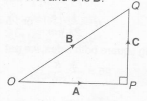Answer:
Option B
Explanation:
Given,
$A= 3\hat{i}-2\hat{j}+\hat{k}, $
$B= \hat{i}-3\hat{J}+5\hat{K} $
$C= 2\hat{i}+\hat{j}-4\hat{k}$
Here, $|A|=\sqrt{(3)^{2}+(-2)^{2}+(1)^{2}}$
or $|A|=\sqrt{9+4+1}=\sqrt{14}$ .....(i)
$|B|=\sqrt{(1)^{2}+(-3)^{2}+(5)^{2}}$
$|B|=\sqrt{1+9+25}=\sqrt{35}$ ......(ii)
and
$|C|=\sqrt{(2)^{2}+(1)^{2}+(-4)^{2}}$
$|C|=\sqrt{4+1+16}=\sqrt{21}$ .........(iii)
From Eqs.(i) , (ii) and (iii) , we get
B2= A2+C2
$(\sqrt{35})^{2}=(\sqrt{14})^{2}+(21)^{2}$
Now, A.C= ($3\hat{i}-2\hat{j}+\hat{k}).(2\hat{i}+\hat{j}-4\hat{k}$)
A.C= 6-2-4=0
Hence, A and C are perpendicular to each other
$\therefore$ Resultant of A and C is B
 B= A+C
B= A+C
[according to triangle law]